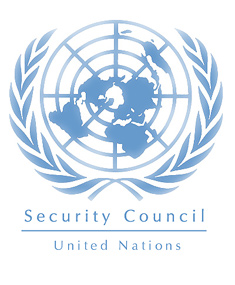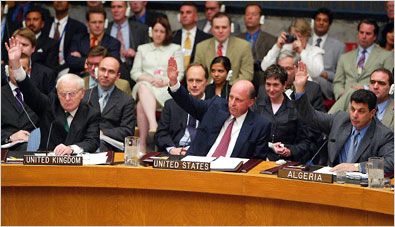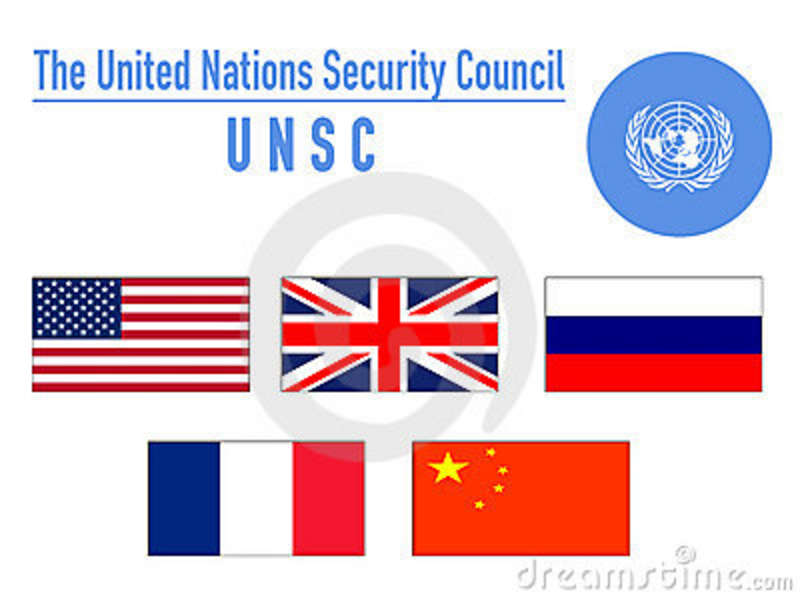United Nations Security Council
 What is UNSC?
What is UNSC?
 The United Nations Security Council (UNSC) is one of the six principal organs of the United Nations and is charged with the maintenance of international peace and security. Its powers include the establishment of peacekeeping operations, the establishment of international sanctions, and the authorization of military action through Security Council resolutions; it is the only UN body with the authority to issue binding resolutions to member states.
The United Nations Security Council (UNSC) is one of the six principal organs of the United Nations and is charged with the maintenance of international peace and security. Its powers include the establishment of peacekeeping operations, the establishment of international sanctions, and the authorization of military action through Security Council resolutions; it is the only UN body with the authority to issue binding resolutions to member states.
UNSC’s Role:
The UN Charter authorizes the Security Council to investigate any situation threatening international peace; recommend procedures for peaceful resolution of a dispute; call upon other member nations to completely or partially interrupt economic relations as well as sea, air, postal, and radio communications, or to sever diplomatic relations; and enforce its decisions militarily, or by any means necessary.
Which countries are members?
The Security Council was created following World War II to maintain world peace. It consists of fifteen members. The great powers that were the victors of World War II—Russia, the United Kingdom, France, China, and the United States—serve as the body's five permanent members. These permanent members can veto any substantive Security Council resolution. The Security Council also has 10 non-permanent members, elected on a regional basis to serve two-year terms. These ten non-permanent members are elected by the General Assembly for two-year terms starting on 1 January, with five replaced each year. The body's presidency rotates monthly among its members. Security Council resolutions are typically enforced by UN peacekeepers, military forces voluntarily provided by member states and funded independently of the main UN budget. As of 2013, 116,837 peacekeeping soldiers and other personnel are deployed on 15 missions around the world.
How are resolutions passed?

 For a resolution to be passed, nine of the 15 council members must vote for it, but permanent members have a veto. That veto power and the global inequality it represents, is at the heart of the struggle over the council and its future.
For a resolution to be passed, nine of the 15 council members must vote for it, but permanent members have a veto. That veto power and the global inequality it represents, is at the heart of the struggle over the council and its future.
Is it still functional? Is it fair?
Seventy years on, hardly anyone claims the Security Council is representative. There are no African or Latin American states among the permanent members. Nor is India, despite its vast population and increasingly powerful economy. It still produces large numbers of resolutions and manages 16 peacekeeping missions, but on Syria, the most lethal and destabilizing conflict in the world today, it is paralyzed by disagreement and vetoes. So is it becoming obsolete?
How to fix it?
One possible remedy is to expand the Security Council and its permanent membership. The existing members have mixed feelings. The UK and France say they are in favor; the US and Russia are more tepid, warning a big council could be less effective. And China is dead against it. And there are also jealous regional rivals who don't want to see their neighbors succeed. But big candidate countries such as Brazil, India, Germany, Japan and South Africa say there is no realistic alternative.
Diluting the veto:
Another possible remedy involves reining in the use of the veto. As of 2012, 269 vetoes had been cast since the Security Council's inception. In this period, China used the veto 9 times, France 18, Russia 128, the UK 32, and the US 89. In recent times, east-west antagonism has brought back paralysis when it comes to major crises. Over the past 10 years, Russia has used its veto on 10 occasions, largely to avoid scrutiny over its actions in Ukraine – or to protect allies, such as the Syrian regime, from UN pressure. China has used its veto six times but never on its own – always in tandem with Russia. The US has issued vetoes three times since 2005, each time to defend Israel from censure. France and others argue an immediate fix would be for permanent members to waive their veto rights in cases of mass atrocities, but Russia is adamant in its opposition.
Membership reform:

 There has been discussion of increasing the number of permanent members. The countries who have made the strongest demands for permanent seats are Brazil, Germany, India, and Japan. Japan and Germany, the main defeated powers in World War II, are now the UN's second- and third-largest funders respectively, while Brazil and India are two of the largest contributors of troops to UN-mandated peace-keeping missions. The United States has unequivocally supported the permanent membership of Japan and lent its support to India and a small number of additional non-permanent members. China has supported the stronger representation of developing countries and firmly opposed Japan's membership.
There has been discussion of increasing the number of permanent members. The countries who have made the strongest demands for permanent seats are Brazil, Germany, India, and Japan. Japan and Germany, the main defeated powers in World War II, are now the UN's second- and third-largest funders respectively, while Brazil and India are two of the largest contributors of troops to UN-mandated peace-keeping missions. The United States has unequivocally supported the permanent membership of Japan and lent its support to India and a small number of additional non-permanent members. China has supported the stronger representation of developing countries and firmly opposed Japan's membership.
India’s bid for UNSC:
India's bid for permanent membership of UNSC is backed by all permanent members – bar China – namely France, Russia, the United Kingdom and United States. But Modi will have to do a lot to attain a permanent seat in the United Nations Security Council (UNSC) which Nehru allegedly turned down in the 1950s. India has served seven terms as a non-permanent member of UNSC and has echoed the need for expansion and reform in the Security Council. A permanent seat in UNSC would elevate India to the status of USA, UK, France, China and Russia in the diplomatic sphere and warrant India a critical say in all global matters.
Why India?
India commands three distinct characteristics which make its case for a permanent seat compelling. Currently having a population of 1.28 billion, India will become the most populous country in the world by 2022. Such a large portion of the planet's population cannot be altogether ignored or kept at a distance from the decision making table of UNSC. Secondly, India happens to be the second fastest growing economy in the world. Thirdly, India is ruled by a democratic, secular government which has never been upstaged by an army coup and can be labeled as a "responsible" nuclear power.
Conclusion:
It is a complex situation. India is growing economically but lags being when it comes to per capita indicators. Owing to its military strength, it is contributing in huge numbers to peacekeeping but cannot match up to the financing levels of P-5 or Japan in relation to peacekeeping operations. The story is a paradox. Prime Minister Narendra Modi is trying his best to get countries on India’s side to help it get a seat in the UN Security Council. Thus today, India finds itself in an unenviable position of having many of its suggestions vetoed by China whose relationship with Pakistan is the cause of much tension in our neighborhood. Can Prime Minister Modi, change this equation? According to experts it has become extremely difficult but he has managed to get India in the limelight.
Sources:
A seat for India on UN Security Council: What Modi is asking for is what Nehru lost
What the UN Security Council Is Not
What's wrong with the UN security council – and how it could do better
Why India deserves a fixed UN Security Council seat
United Nations Security Council
We are not welcome: Why PM Modi should stop chasing UN Security Council mirage
India makes fervent pitch for permanent seat in UNSC
Cover Image: http://www.freedigitalphotos.net Contributor: vectorolie
Cover Image: http://www.freedigitalphotos.net Contributor: cbenjasuwan
Cover Image: http://www.freedigitalphotos.net Contributor: Stuart Miles